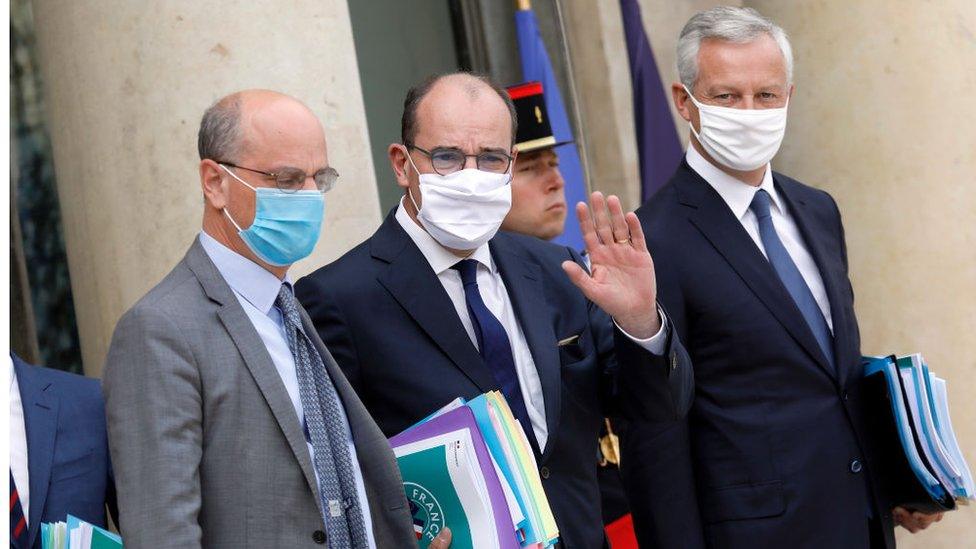France in huge coronavirus recovery plan focusing on green energy
- Published

Prime Minister Jean Castex, flanked by education minister Jean-Michel Blanquer (L) and economy minister Bruno Le Maire (R)
France has unveiled a 100bn-euro (ВЈ89bn) economic stimulus package to help repair the economic damage caused by coronavirus.
President Emmanuel Macron's government said the investment would include big spending on green energy and transport.
Dubbed "France re-launch", it is aimed at reversing rising unemployment, and includes tax cuts for business.
The economy shrank by 13.8% between April and June, the biggest quarterly fall since the Second World War.
Unveiling the plan, whose €100bn price tag is the equivalent of 4% of France's annual economic output, Prime Minister Jean Castex said it was almost four times bigger than the rescue strategy implemented after the financial crisis of 2008.
Its goal is to move away from the emergency funding of the coronavirus crisis and to make long-term investments in employment and training, as well as in France's transformation to a green economy.
About €40bn of the funding will come from the new European Union recovery fund.
About €35bn has been earmarked for projects to make the economy more competitive, and €30bn will be used on greener energy policies. About €6bn is slated for making public buildings and homes better insulated. The hydrogen industry, a sector which is receiving huge investment in Germany, will get €2bn.
The rest of the investment package will go on supporting jobs, training and broader social initiatives with the aim of creating at least 160,000 jobs next year.
Mr Castex said the money would be spent over the next two years, and he hoped the investment would return the economy to its pre-pandemic levels by 2022. The next French presidential election is due to get under way in April 2022.
"Economically and socially it is infinitely better to temporarily worsen the pubic finances to invest, re-arm the economy and move forward than to sink into austerity and let unemployment and human drama explode," Mr Castex told a media briefing.
Mathieu Orphelin, who left Mr Macron's party last year to set up a more environmentally-focused party, told Reuters."It [the plan] is good, but this can't be limited to two years, we need to keep it up for 10 years."
Thierry Drilhon, president of the Franco-British Chamber of Commerce, told the ґуПуґ«ГЅ he thought the stimulus package would help those industries that had suffered "significantly" in the coronavirus crisis, as long as the investment was properly implemented.
"Obviously execution will be key to make sure that investment will be well utilised," he said. "We all know that you can have the right vision, but vision without execution is just hallucination."
France is on course for one of Europe's worst recessions, with an 11% drop in economic output forecast for 2020 as a whole.
- Published21 July 2020
- Published7 July 2020